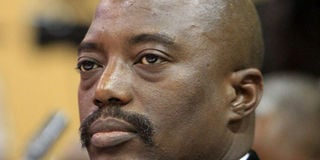UN hits out at surge in extra-judicial 'executions' in DR Congo

Violence in Kasai erupted after a tribal chieftain known as the Kamwina Nsapu, who rebelled against the regime of President Joseph Kabila, was killed in August 2016
What you need to know:
- UN Secretary-General Antonio Guterres on Monday called for "credible investigations" into the killings.
- On Wednesday the DR Congo told Belgium it was willing to "promptly" shutter Shengen House, a quasi consulate in Kinshasa that represents 17 EU members plus Norway, AFP learned via a Congo government source.
The UN mission in the Democratic Republic of Congo on Wednesday reported a surge in summary "executions" in the country, notably in the southern Kasai region.
In 2017, "state agents" carried out 1,176 extra-judicial killings, "including at least 89 women and 213 children," the United Nations Mission in Congo (MONUSCO) said in an annual report on human rights violations in the DRC.
Such killings have tripled over the past two years, MONUSCO said, adding that it condemned the increase.
The armed forces accounted for nearly two-thirds -- 64 percent -- of extra-judicial killings by state agents, it said.
Across the country, a total of 6,497 violations and abuses -- committed not just by state agents but also by armed groups -- were recorded in 2017.
This was a rise of more than 25 percent over 2016, which itself saw a 30 percent rise over 2015.
A sprawling, mineral-rich country in central Africa, the DRC is in the grip of several conflicts, including political and ethnic unrest as well as violence by militia groups.
The rise in arbitrary killings last year is mainly explained by the "persistent crisis" in three provinces constituting the Kasai region, where at least 752 people were executed, the report said.
'Silence the critics'
Violence in Kasai erupted after a tribal chieftain known as the Kamwina Nsapu, who rebelled against the regime of President Joseph Kabila, was killed in August 2016.
More than 3,000 people have died and some 1.4 million have been displaced since then.
The Kamwina Nsapu's militia was responsible for the death of at least 79 civilians, including seven women and nine children, the report said.
Another militia, the Bana Mura, sometimes operating with the support of army soldiers, killed at least 67 civilians, including nine women and 21 children, it added.
Two UN experts were killed last March while investigating violence in Kasai, where the United Nations has counted more than 80 mass graves.
Protest crackdown
The rise in extra-judicial killings comes as the government has cracked down on a number of anti-government demonstrations across the country.
On Sunday, six people were killed in Kinshasa during a protest that demanded Kabila leave power, according to the UN.
Scores were injured and dozens arrested when security forces opened fire on the Catholic Church-organised rally.
UN Secretary-General Antonio Guterres on Monday called for "credible investigations" into the killings.
Congolese authorities have "systematically resorted to unjustified and disproportionate restrictions to fundamental freedoms and acts of harassment" of political opponents, journalists and human rights activists in an attempt to "silence the voices seen as critics", the MONUSCO report stated.
As well as criticising the crisis-hit country, the report also praised some of the work done by the judiciary, stating that at least 150 army soldiers and 51 national police agents were sentenced in 2017 over human rights violations.
The report praised efforts by judicial authorities to fight against what it called "impunity".
But the recent protests have also raised diplomatic tensions between Kinshasa and Europe, particularly its former colonial overseer Belgium, which has condemned the violence against demonstrators.
On Wednesday the DR Congo told Belgium it was willing to "promptly" shutter Shengen House, a quasi consulate in Kinshasa that represents 17 EU members plus Norway, AFP learned via a Congo government source.
The building helps process visas for any Congolese citizens wanting to head EU countries that are part of the Schengen region.
The letter sent by Kinshasa also said authorities planned to close down Belgium's development agency in the country.
The Belgian foreign ministry said it had yet to authenticate that the request was genuine, Bela press agency reported.
France, the United Kingdom, the United States and Canada have also condemned the recent killing of protesters.



